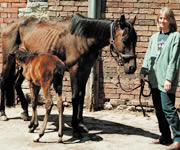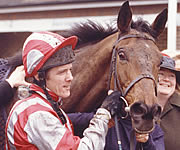Animal Aid recently won a debate on BBC’s Countryfile, in which the public agreed that horse racing is cruel. Following scenes of carnage at the 2004 Grand National, Animal Aid has again called for the race to be banned.
Dear Brough
When I was a kid, the BBC used to trail the Grand National with lots of footage of horses crashing to the ground, their necks and backs bending at impossible angles. God knows how many of those clips represented equine fatalities. The presentation suggested a kind of Tom and Jerry cartoon spills-and-thrills event: the horses fall, then they get up and all’s as it was.
The trouble is, it isn’t. Even though the BBC is careful these days about excising all the evidence, horses still die wretchedly every year at the three-day Aintree meet. One died in last year’s National itself and most didn’t finish. The National is a deliberately punishing and hazardous event: very long, with high, awkward jumps. My view is that it contravenes the 1911 Protection of Animals Act, which prohibits “unnecessary suffering”, and should therefore be banned.
Andrew
Dear Andrew
When I was a kid I dreamt of riding in the Grand National. When I was 22 I did so and landed up in Walton Hospital. Time trotted away unharmed. The Grand National is the greatest challenge in steeplechasing, for man as well as horse. The question is whether we are entitled to put the horse as well as ourselves at risk.
Having been involved with these horses all my life, I am extremely conscious of the risks in which jump racing involves them. To that end there have been modifications of the fences, improved equine rescue and welfare services, and the lowest ever level of injuries and fatalities. But I can’t pretend it remains other than a very dangerous game.
Yet I do not believe it is a cruel one. The horse that runs in the Grand National has a quality of care beyond almost all other active animals. He is a superb athlete, the fastest weight-carrying, fence-jumping creature the world has ever seen. The Grand National is his ultimate fulfilment as well as sternest test. Do we have the right to ask him to do so? I believe we do. So, incidentally, does the RSPCA. But it doesn’t mean I approach Aintree without fear for the test ahead.
Brough
Dear Brough
You may have wound up in hospital at 22 but to imply that the Grand National is a mutual endeavour, where the risks and honours are shared between jockey and horse, is anthropomorphic nonsense. The fact that the RSPCA legitimises the Grand National is to its shame not credit.
Despite modifications and “improved welfare services”, the National continues to kill horses routinely. They break their backs, necks and legs, and suffer heart failure. It remains what it always was: a wilfully perverse challenge for conscripted equine labour. Yes, jockeys – who are willing participants – get injured in this and other races; and occasionally they die. But, every year, around 300 horses die from their injuries while racing or during training. A detailed analysis Animal Aid conducted of the 1999/2000 jump season found that 1 in 31 of the horses who began the season had perished by the end of it. No sport on earth would be permitted with that kind of human attrition rate.
Your suggestion that Grand National horses are cherished and cosseted is more sentimental fakery. I won’t deny that there can be weeping when horses perish – or that some of those involved get attached to their animals. But the facts show that the thoroughbred horse is treated as a mass-produced commodity. Many more are produced than make it to the starter’s flag. Some of the “failures” end up as pet food, are fed to hunting hounds or are left standing in a field contemplating the traffic. The same fate awaits many “successful” horses at the end of their careers.
Andrew
Dear Andrew
I respect your sincerity but still believe that “anthropomorphic nonsense” encapsulates your position exactly. For you are objecting that a racehorse is “conscripted labour”. How can he, or any animal that has been bred and raised by man, be a volunteer? On that premise there could be no racing of any kind, and the logic extends right through to the food supply itself. You most certainly cannot have turkeys for Christmas.
But let’s not be flip. You raise statistics, so let’s use the harsh, inescapable ones for the Grand National over the last five years. There have been four fatalities from 192 runners, 2.1%. Accuse me of “sentimental fakery” if you like, but every empty bridle is its own little tragedy. The question is whether we should be allowed to set out on a journey which puts horses, and to a lesser extent their riders, at mortal risk.
This is the mountaineer’s question with animals added. I believe the dangers are worth the daring; that the whole structure of jump racing adds greatly to both our sporting and our rural life. Your group is called “Animal Aid”, yet you do not want to aid the steeplechaser, the racehorse, or any “conscripted animal”. Your stance will abolish them.
Brough
Dear Brough
Your first message has man and horse striving in common partnership. Now you acknowledge my point: that horses are bred to be used by the racing industry. They are bought, sold and disposed of when they have no more commercial utility – therefore they are products. I have plenty of concerns about the ruthless production of turkeys, shoulder to shoulder in stinking, airless sheds. But we’re here to debate the use of horses in racing.
You tell me the equine mortality rate at the National is acceptable (that’s for ONE race – remember that they have lots of others throughout the year to get killed in). Do you also accept the 80% incidence among race horses of bleeding lungs and the 90% incidence of gastric ulcers, both stress-related conditions? The horses wouldn’t exist unless we used them in this way? Let me propose a 21st century compact: we allow them to exist but we don’t exploit them.
Andrew
Dear Andrew
Of course the Grand National is about man and horse striving in common partnership. Have a look on Saturday. I am here to tell you that man never gets closer to a four-legged partner than when the starter calls you in at Aintree. And of course the racehorse is a product of man’s planning. Racecourses are man-made. Racing is equine athletics, where these creatures are put to the test. The issue for racing in general and the Grand National in particular, is whether we have the right to set these tests. I believe we do.
From experience all over the world, I know that British racing makes more effort for horse welfare than any other territory. But this is still athletic competition, there is still stress, accidents and fatalities. But I think it is worth it; you do not. You appear to believe in producing racehorses but not having them race.
I yield to no one, not even to you, Andrew, in my affection for and knowledge of the thoroughbred. I am chairman of the Moorcroft Welfare Centre for retired racehorses and rode one over the hills this morning. If I, and he, were still young and bold enough, I would be proud to ride him in the Grand National this week. It would be a challenge and a risk for both of us. Maybe that makes me a monster. Maybe not all the millions who watch on Saturday would think like you.
Brough
Dear Brough
You continue to fixate on the soft-focus “romance” of racing while ducking the cold reality. Hundreds die from injuries every year, and you tell me that’s an acceptable risk (pity the horses have no say in the matter). You are equally sanguine about the endemic levels of stress-related sickness and the disposal of those who fail to make the grade. The thoroughbred – as many in the industry now acknowledge – is getting progressively more feeble and prone to injury because of high-tech selective breeding processes that concentrate on speed at the expense of health.
I’m gratified to hear of your work for retired horses but the (enormously wealthy) industry as a whole is criminally remiss on this front. There was no proper scheme at all until 2000 and the amounts currently offered are insultingly small. No wonder the woman who runs one of the few official rehabilitation centres reported that she was turning away two or three horses every day – and that the situation is getting worse. It’s time, Brough, to dispense with the romance and confront the reality of your trade.
Andrew
Dear Andrew
You seem to forget that it is I, as rider, writer and administrator, who has had to confront the harsh realities of the racing trade. The falls, accidents and, yes, fatalities are something we can try and prepare for but never overcome. Unlike you, I have stood with tired horses after the National every year at Aintree. I will do so again this time. We have put them into this contest, we deserve to see them protected as best we can.
Your position is that man does not have the right to put horses at risk; mine that if you accept the risks you have to do everything to ready horse as well as man for the challenge ahead, and that the challenge – most noticeably in the Grand National – is worth the consequences, fair or shine. The logic of your position sees not just no Grand National, but no racing, no animals except those in the wild. That’s not Animal Aid, but animal ending. Why not join me to improve racing, not destroy it?
Brough




